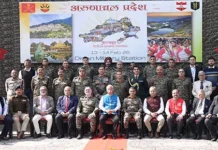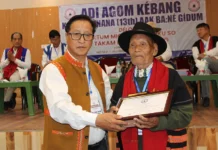[ Samshum Changmi ]
A struggling lifeline
Nestled in the pristine landscapes of Arunachal Pradesh, Changlang district grapples with a distressing conundrum at the heart of its public distribution system (PDS). The PDS, which is meant to be a lifeline for the vulnerable population, is marred by an array of problems that thwart its core purpose. The hard facts and statistics paint a grim picture of a system in dire need of reform.
The central players
At the epicentre of the crisis is the wholesale nominee-cum-carriage contractor, entrusted with the vital task of delivering foodgrains from the Food Corporation of India (FCI) base depot located in Kharsang to the fair price shops (FPS). Unfortunately, this key player in the chain has been persistently falling short in its obligations. To exacerbate matters, the FPS permits and licences, which are originally intended for local individuals, have been frequently sublet to prominent shop owners situated mostly in township areas.
The repercussions of this convoluted arrangement are nothing short of a nightmare for the poor villagers, especially in areas like Khimyang, Changlang, Kantang, Rima-Potuk, and beyond. They are compelled to traverse considerable distances from their remote villages to access their meagre allocations of rice. This practice becomes a harrowing ordeal for many inhabitants. For instance, the 51-year-old gaon bura of Lungpang village in Rima-Potuk circle of Nampong expressed frustration over having to trek several kilometres to access his rightful portion of PDS rice.
This predicament persists despite the FPS being designated in Rima-Potuk circle headquarters in Rima, not in Nampong town. The GB emphasised: “During the rainy season, villagers seldom undertake the journey to Nampong for PDS rice. Regrettably, we often have to forgo our share, even though it’s when we need it the most,” he said.
Another woman, from Jongji Havi village in remote Khimyang circle, shared her ordeal, stating that she has to wake up early in the morning to reach Khimyang to collect her PDS rice. She lamented that, despite enduring hours of tiring walking, she often arrives at the shop after it has closed, and she has to return home empty-handed.
The heartbreaking stories of villagers like the GB of Lungpang village and the woman from Jongji Havi vividly illustrate the daily struggles they face, emphasising the dire need for change.
However, these are not isolated incidents but rather emblematic of the larger crisis within Changlang district’s PDS.
Mismanagement and accountability
The complete disregard for the geographic challenges faced by Changlang district’s residents is exemplified by the plight of Vijaynagar circle, located 157 kilometres from Miao and a daunting 179 kilometres from the FCI base depot in Kharsang. To make matters worse, this region did not receive any foodgrains for six straight years, from January 2016 to December 2022, leaving the local population in dire straits.
Under the management of M/s Namdapha Multipurpose Cooperative Society (MPCS) Ltd, Neotan, the then land route carriage contractor, a shocking revelation came to light. At least 3,336.87 quintals of PDS rice meant for Vijaynagar circle were found in a rotten condition.
Subsequently, under M/s Yatdam MPCS Ltd, Yatdam, an even more staggering 7,332 quintals of PDS rice were discovered to be damaged by the verification board led by Vijaynagar EAC AJ Lungphi. The responsibility for this mismanagement can be directly attributed to the carriage contractor’s blatant disregard and the authorities’ lack of commitment.
Adding to the gravity of the situation is the fact that both the Namdapha MPCS and the Yatdam MPCS have authorised Rajesh Agarwal, a businessman based in Assam’s Margherita, as the legal contractor for cost deposit, procurement, lifting, transportation, and distribution of PDS foodgrain in Changlang district. It’s notable that Agarwal is one of the 96 accused in the infamous multi-crore PDS scam of 2004, further highlighting the need for urgent reform.
Systematic overview
Furthermore, the PDS land route carriage contractors’ services are mandated for a one-year period and are selected through tender process. The government-approved rate for transportation is fixed at Rs 3.27 per kilogram (Rs 327 per quintal), considering various factors, including distance and unforeseen costs. In Changlang district, which comprises sixteen administrative circles with a total of 103 FPSs, there are 15,733 ration cards, with 13,390 being priority household cards (PHH) and 2,343 being Antyodaya Anna Yojana (AAY) cards. The allocated foodgrains per month for Changlang district amounts to 7,493.05 quintals (as of April 2023), with a significant portion allocated to address priority household needs.
This situation echoes the challenges experienced in numerous districts across Arunachal, and it has now reached a juncture where it cries out for immediate intervention, transparency, and accountability within the PDS.
Proposed solution
When considering solutions to these challenges, the focus must shift towards ensuring that the marginalised villagers have unimpeded access to their allocated foodgrains. Such a transformation would not only alleviate their daily hardships but also contribute to a substantial reduction in the egregious wastage of precious grains.
One key solution is for the government to establish robust oversight mechanisms to monitor the performance of wholesale nominee-cum-carriage contractors. This should include conducting regular audits of their operations to ensure on-time and efficient delivery of foodgrains.
Additionally, the government must consider revising the fixed transportation rate to one that is flexible and based on the distance from the FCI base depot. This will incentivise contractors to serve even the most remote areas, thereby reducing the hardships faced by villagers.
Moreover, the district authorities need to implement stricter regulations to prevent the subletting of FPS permits and licenses. They should hold local permit holders accountable for ensuring the operation and accessibility of FPS in designated locations.
In conclusion, Changlang district’s PDS, like many others, stands at a crossroads, desperately requiring a comprehensive overhaul. It is high time for a meticulous review and reassessment to ensure that the intended beneficiaries are not only able to receive assistance, but that this assistance reaches those who need it most. It is incumbent on the government to step in, investigate the systemic shortcomings, and put into place measures that will steer the PDS back on track, thus ensuring that the promises of food security are fulfilled for the most vulnerable members of society. (Samshum Changmi is Chief Editor, Eastern Today News Network, Kharsang, and may be reached at Samsc20@gmail.com)




